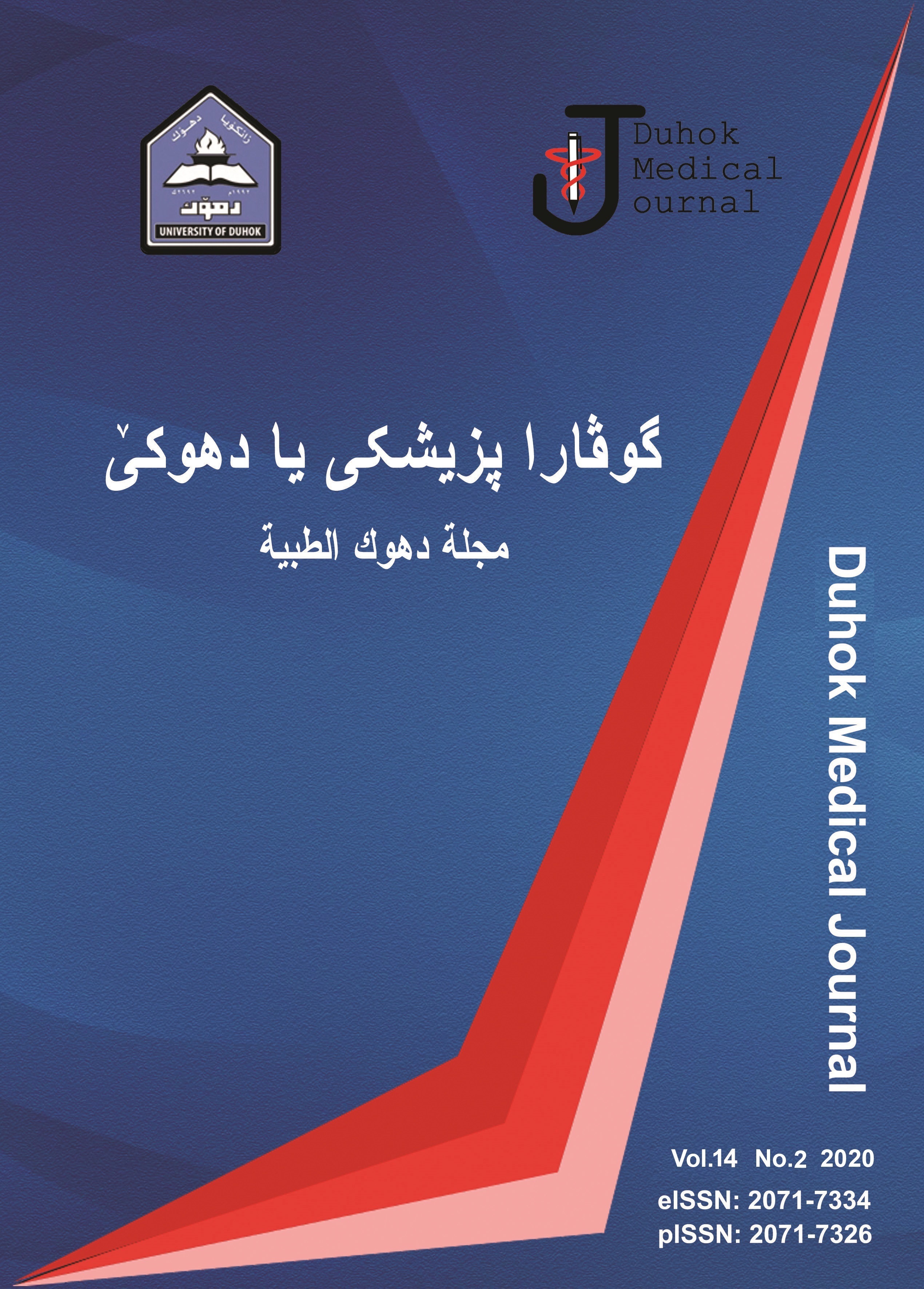PREVALENCE AND ASSOCIATED FACTORS OF ASPIRIN NON-RESPONSIVENESS IN PATIENTS UNDERGOING PERCUTANEOUS CORONARY INTERVENTION IN DUHOK-IRAQ
Abstract
https://doi.org/10.31386/dmj.2020.14.2.4
Background: The anti-platelets action of aspirin is not universal in all patients undergoing percutaneous coronary intervention (PCI). We evaluated the prevalence and associated risk factors of aspirin nonresponsiveness in patients undergoing stenting in Duhok-Iraq.
Methods: Eighty patients with coronary artery disease (CAD) undergoing PCI with drug eluting stents from 2015 to 2017 in Duhok-Iraq were enrolled after completion of the first year of dual antiplatelet (Aspirin plus Clopidogrel) while receiving aspirin 100 milligrams regularly. A detailed cardiac assessment, cardiovascular risk factors, and coronary angiographic profile of cases were reviewed. Aspirin responsiveness was assessed by measuring serum thromboxane B2 assay. Then a correlation with associated factors was performed. For major adverse cardiac events, responders and non-responders were followed up for a further two years.
Results: The mean age of cases was (59.28± 8.43 years). Thirty-nine were females. The aspirin nonresponsiveness was 14%. None of the risk factors were associated significantly with non responsiveness (p>0.05). Besides, significant differences in rates of adverse cardiac events were absent between responders and non-responders throughout the follow-up period.
Conclusions: Aspirin nonresponsiveness is not uncommon among our patients. No clear association with risk factors was detected. Short term adverse cardiac events rate between responder and non-responders was not affected.
Downloads
References
2. Erin D. Michos. Reza Ardehali, Roger S. Blumenthal, Richard A. Lange, Hossein Ardehali. Aspirin and Clopidogrel Resistance. Mayo Clinic Proceedings. 2006; 81: 4; 518-526
3. Sharma RK, Reddy HK, Singh VN, Sharma R, Voelker DJ, Bhatt G. Aspirin and clopidogrel hyporesponsiveness and non responsiveness in patients with coronary artery stenting. Vasc Health Risk Manag. 2009; 5:965–972. doi:10.2147/vhrm.s6787
4. Kidson‐Gerber G, Weaver J, Gemmell R, Prasan AM, Chong BH Serum thromboxane B2 compared to five other platelet function tests for the evaluation of aspirin effect in stable cardiovascular disease. Heart Lung Circ. 2010; 19: 234–242
5. American Diabetes Association Standards of Medical Care in Diabetes 2010. Diabetes Care. 2010;33 (Suppl 1): S11–S61. doi:10.2337/dc10-S011.
6. ChobanianAV, BakrisGL, BlackHR, CushmanWC, GreenLA, IzzoJL, etal. The Seventh Report of the Joint National Committee on Prevention, Detection, Evaluation, and Treatment of High Blood Pressure. The JNC 7 Report. JAMA. 2003; 289(19):2560–2571. doi:10.1001/jama.289.19.2560.
7. Pasternak RC. Report of the Adult Treatment Panel III: the 2001 National Cholesterol Education Program guidelines on the detection, evaluation and treatment of elevated cholesterol in adults. CardiolClin. 2003; 21:393–398.doi: 10.1016/S0733-8651(03)00080-8.
8. Parmar MS. Family history of coronary artery disease need to focus on proper definition. Euro Heart J. 2003; 24 (22):2073.doi: 10.1016/j.ehj.2003.06.010.
9. Ryan H, Trosclair A, Gfroerer J. Adult Current Smoking: Differences in Definitions and Prevalence Estimates—National Health interview Survey (NHIS) and National Survey on Drug use and Health (NSDUH) 2008. J Environ Public Health. 2012; 2012:1–11. doi:10.1155/2012/918368.
10. P. A. Sadiq, Aniket Puri, Madhu Dixit, A. Ghatak, Sudhanshu K. Dwivedi, Varun S. Narain et al. Profile and prevalence of aspirin resistance in Indian patients with coronary artery disease. Indian Heart J. 2005; 57(6): 658–661.
11. Mansour K, Taher AT, Musallam KM, Alam S. Aspirin resistance. Adv Hematol. 2009; 937352. doi:10.1155/2009/937352
12. Liu L, Cao J, Fan L, Hu G, Hu Y, Zhu B, et al. Prevalence and Risk Factors for Aspirin Resistance in Elderly Patients with Type 2 Diabetes. Int J Gerontol. 2011; 5(2): 112–6.
13. L. Christiaens, S. Ragot, J. Mergy, J. Allal, and L. Macchi. Major clinical vascular events and aspirin-resistance status as determined by the PFA-100 method among patients with stable coronary artery disease: a prospective study. Blood Coagulation & Fibrinolysis. 2008; 19:3. pp. 235–239.
14. Gum PA, Kottke-Marchant K, Poggio ED, Gurm H, Welsh PA, Brooks L et al. profile and prevalence of aspirin resistance in patients with cardiovascular disease. JACC. 2001; 88:3, pp. 230–235.
15. Pamukcu B, Oflaz H, Oncul A, Umman B, Mercanoglu F, Ozcan M, et al. The role of aspirin resistance on outcome in patients with acute coronary syndrome and the effect of clopidogrel therapy in the prevention of major cardiovascular events. Journal of Thrombosis and Thrombolysis. 2006; 22:2, pp. 103–110.
16. Lev EI, Patel RT, Maresh KJ, Guthikonda S, Granada J, DeLao T, et al. Aspirin and clopidogrel drug response in patients undergoing percutaneous coronary intervention: The role of dual drug resistance. J Am Coll Cardiol. 2006; 47: 27–33.
17. Chen WH, Cheng X, Lee PY, Ng W, Kwok JY, Tse HF, et al. Aspirin resistance and adverse clinical events in patients with coronary artery disease. Am J Med. 2007; 120:631–635.
18. Zimmermann N., Hohlfeld T. Clinical implications of aspirin resistance. Thromb. Haemost. 2008; 100:379–390. doi: 10.1160/TH08-01-0056.
19. ArmenYuri Gasparyan, Timothy Watson, Gregory Y.H. Lip. The Role of Aspirin in Cardiovascular Prevention. JACC. 2008; 51 (19) 1829-1843; DOI: 10.1016/j.jacc.2007.11.080
20. Mohammad AM, Al-Allawi NAS. CYP2C19 Genotype is an Independent Predictor of Adverse Cardiovascular Outcome in Iraqi Patients on Clopidogrel After Percutaneous Coronary Intervention. J Cardiovasc Pharmacol. 2018; 71(6):347-351. doi: 10.1097/FJC.0000000000000577
21. Neubauer H, Kaiser AF, Endres HG, Krüger JC, Engelhardt A, Lask S, et al. Tailored antiplatelet therapy can overcome clopidogrel and aspirin resistance - The BOchum CLopidogrel and Aspirin Plan (BOCLA-Plan) to improve antiplatelet therapy. BMC Medicine. 2011; 9:3.
22. Kumaran Kolandaivelu, Deepak L. Bhatt. Overcoming resistance to antiplatelet therapy: targeting the issue of non-adherence. Nature Reviews Cardiology. 2010; 7, pp461–467.






